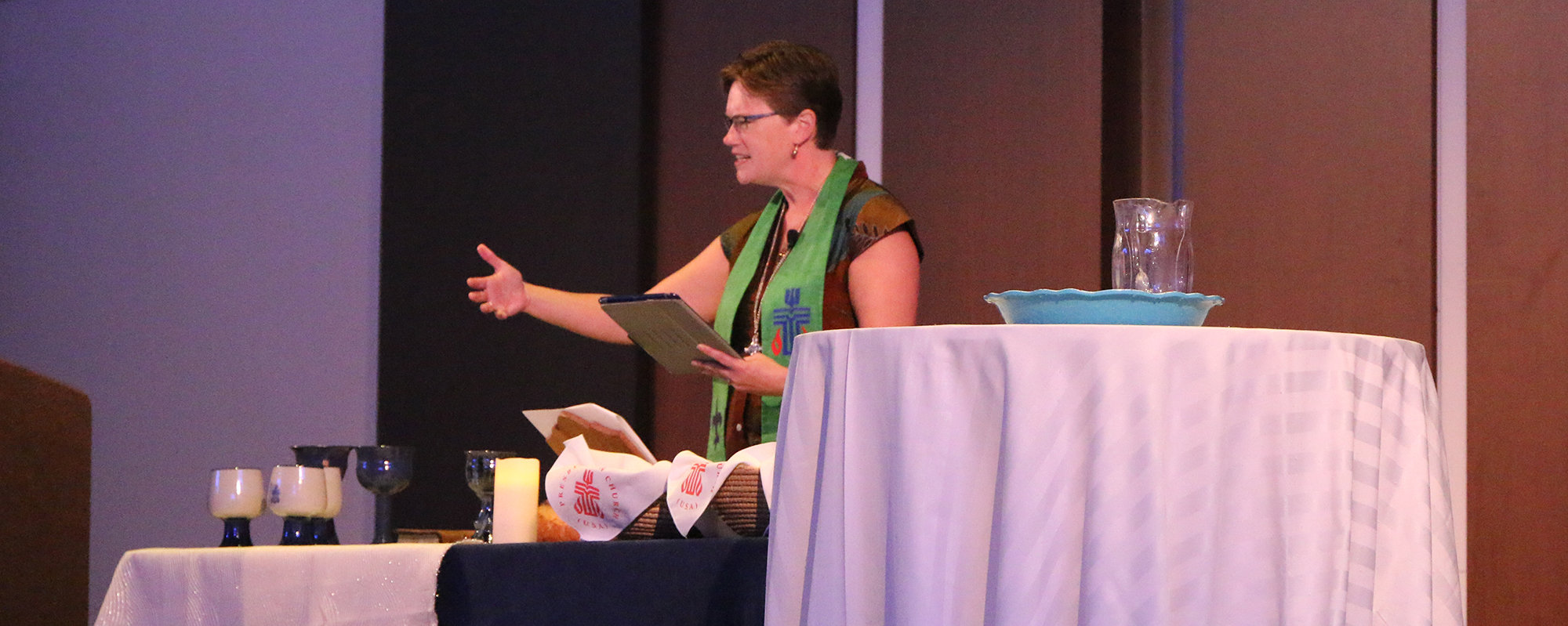
Leslie Connie was among the musicians participating in closing worship at the Mid Council Gathering in Chicago. Photo by Rick Jones
The Mid Council Leaders’ Gathering wrapped up on World Communion Sunday, celebrating a oneness with Christ. Leaders within the Presbyterian Church (U.S.A.) took the final hours to share their vision and hopes for the church moving forward.
The Rev. Dr. Diane Moffett, president and executive director of the Presbyterian Mission Agency, told the group that the church seeks to strengthen relationships and collaborate with mid councils.
“We believe God calls us to act boldly and compassionately so that faith comes alive and the world wakes up to new possibilities,” she said. “We want to be a church of action, celebrating churches, small and large, that are working to change communities. We want to be a Matthew 25 church.”
Moffett says the Mission Agency has a “trifold focus” moving forward. “We want to focus on vital congregations. It’s not about how big a church is, it’s about faithfulness to Jesus Christ. Poverty is another emphasis. It’s not simply getting food for the hungry but finding out why they are hungry and dismantling those systems that take away the hope of God’s people,” she said. “We also want to deal with racism and white supremacy and dismantle the systems that oppress people of color.”
The Rev. Frank Clark Spencer, president of the Board of Pensions, talked of the need to provide adequate benefits for those who are called into ministry. According Spencer, approximately 76 percent of Presbyterian men in ministry have benefits, compared to 62 percent for women.
He pointed out that those who become ministers are likely to leave after 10 years if they do not have adequate benefits such as healthcare. He also provided statistics showing disparities in the salaries of ministers based on gender.
%400%2C5x_medium400.jpg)
The Rev. Frank Clark Spencer, president of the Board of Pensions, addressed issues of gender, race and fair pay during the final day of the Mid Council Leaders Gathering. —Photo by Rick Jones
“I believe as faithful as we are, institutionally, the PC(USA) has forgotten some of who we are, or at least who we were,” he said. “There are times it’s important to remember what those connections and relationships are.”
Spencer announced that the Board of Pensions has entered into partnership with Johnson C. Smith Theological Seminary to offer a CREDO session that will be African-American-centric and address specific issues within the community.
“This is not intended to be a permanent separation of majority and minoritized people,” he said. “It is an intentional gathering, led by people within the community, to address the struggles of being an African-American leader in a predominantly white denomination. If we don’t recognize that these are unique issues, we are fooling ourselves.”
Spencer said the issues of gender, race and fair pay need the church’s attention.
In his final words at the gathering, the Rev. Dr. J. Herbert Nelson, II, Stated Clerk of the PC(USA), told mid council leaders that transformative change is needed if the church is to survive. “We are not the big kahuna in the room anymore,” he said.
Nelson referred to the actions of attendees at the General Assembly in St. Louis and the march that generated national interest. He encouraged churches to continue speaking out on social justice issues and provide a path for the next generation.
“They are asking questions and we are failing to give them answers that correlate with their current realities,” he said. “We have to always remind ourselves that the work we do is not for us. It belongs to the Lord.”
The meeting concluded with worship, led by the Rev. Cindy Kohlmann, co-moderator of the 223rd General Assembly.
“I believe the Lord is speaking to us today, and you have heard it over the past few days. We’re being called to a different fast. We are being called to a fast that leads us into faithful ministry alongside our neighbors,” she said. “A fast that requires us to step out of our comfort zones and learn how to follow God into a new thing and new way that we can’t fully imagine yet, but trust because it’s Jesus.”
The Mid Council Leaders Gathering was cosponsored by the Office of the General Assembly and Board of Pensions of the PC(USA).

he Rev. Cindy Kohlmann, co-moderator of the 223rd General Assembly, preached during the gathering. Photo by Rick Jones
